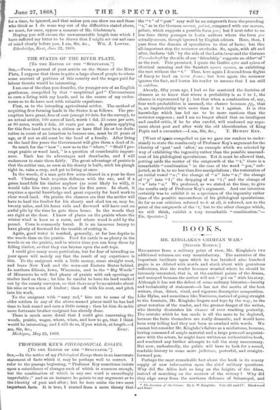THE STATES OF TEIE RIVER PLATE.
[To THE EDITOR OF THE "SPECTATOR."]
SIR,—From a perusal of your article on the States of the River Plate, I suppose that there is quite a large class of people to whom some account of portions of this country and the wages paid for labour therein would be interesting.
I am one of the class you describe, the younger son of an English gentleman, compelled by that " unspiritual god " Circumstance to earn a living with my hands, and in the course of my endea- vours so to do have met with valuable experience.
First, as to the intending agricultural settler. The method of acquiring free farming lands in the States is as follows. The pre- emption laws grant, free of cost (except 10 dols. for the survey), to an actual settler, 160 acres of land, worth 1 dol. 25 cents per acre, or 80 acres, worth 2 dols. 50 cents per acre. A. person applying for this free land must be a citizen or have filed his or her decla- ration in court of an intention to become one, must be 21 years of age, or if not so old must be the head of a family. After living on the land five years the Government will give them a deed of it.
So much for the " how " ; now as to the " where." " Shall I pre- empt prairie or wood land, " is a question of considerable import- ance. Each has its advantages and drawbacks, and I will endeavour to state them fairly. The great advantage of prairie is that the settler can, as soon as his shanty is built, stick his plough right in. raise a crop, and get to living at once.
In the woods, if a man gets five acres cleared in a year he does well. Clearing bush requires deftness with the axe, and if a green hand fells his timber anyhow (as most likely he will), it would take him two years to clear his five acres. In short, it requires a special knowledge and great capacity for hard work to clear wood land. On prairie the chances are that the settler will have to haul the lumber for his shanty and shed ten or, may be, twenty miles, and his fence rails and firewood will have cost an awful pile by the time he gets them home. In the woods they are right at the door. I know of places on the prairie where the winter wind is keen as a razor, and where wood is sold by the pound. Corn is commonly burnt. It is an immense luxury to have plenty of firewood for the trouble of cutting it.
Again, good water is reached, generally, at far less depths in the woods than on the prairie. Feed for cattle is as plenty in the woods as on the prairie, and in winter time you can keep them by felling timber, so that they can browse upon the soft tops.
1 could give many more particulars, but for fear of intruding on your space will merely say that the result of my experience is this. To the emigrant with a little money, come straight west, and leave New York and the worn-out Eastern States behind. In northern Illinois, Iowa, Wisconsin, and in the " Big Woods" of Minnesota he will find plenty of prairie with oak openings or timber land on them ; let him be careful to have his land marked out by the county surveyor, so that there may be no mistake about his nine or ten acres of timber ; then off with his coat, and pitch into his work.
To the emigrant with " nary red," hire out to some of the older settlers in any of the above-named places until he has had time to look round and earn a little money ; then let him do as his more fortunate brother emigrant has already done.
There is much more detail that I could give concerning the woods, prairie, wages, where, when, and how to go, that I think would be interesting, and I will do so, if you wish it, at length.—I






























 Previous page
Previous page